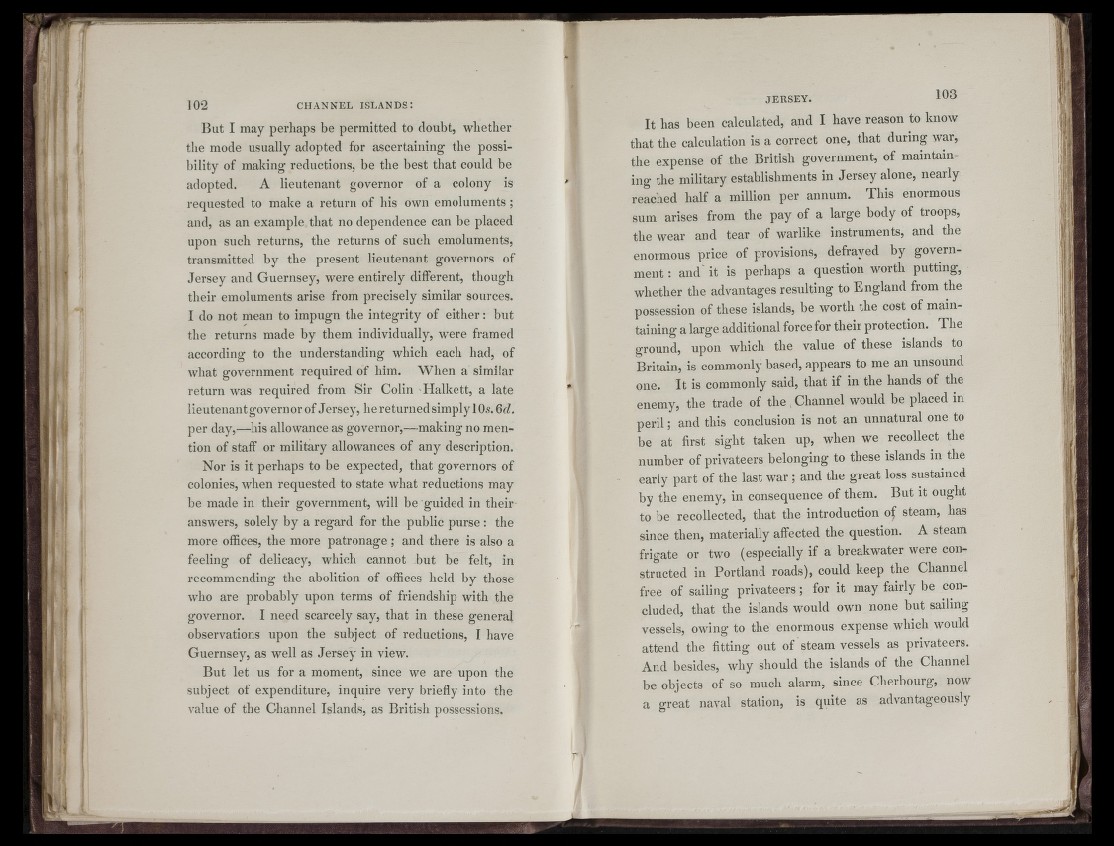
But I may perhaps be permitted to doubt, whether
the mode usually adopted for ascertaining the possibility
of making reductions, be the best that could be
adopted. A lieutenant governor of a colony is
requested to make a return of his own emoluments ;
and, as an example that no dependence can be placed
upon such returns, the returns of such emoluments,
transmitted by the present lieutenant governors of
Jersey and Guernsey, were entirely different, though
their emoluments arise from precisely similar sources.
I do not mean to impugn the integrity of either: but
the returns made by them individually, w’ere framed
according to the understanding which each had, of
what government required of him. When a similar
return was required from Sir Colin Halkett, a late
lieutenantgovernor of Jersey, he returned simply 1 Os. 6fZ.
per day,—his allowance as governor,—making no mention
of staff or military allowances of any description.
Nor is it perhaps to be expected, that governors of
colonies, when requested to state what reductions may
be made in their government, will be guided in their
answers, solely by a regard for the public purse : the
more offices, the more patronage; and there is also a
feeling of delicacy, which cannot but be felt, in
recommending the abolition of offices held by those
who are probably upon terms of friendship with the
governor. I need scarcely say, that in these general
observations upon the subject of reductions, I have
Guernsey, as well as Jersey in view.
But let us for a moment, since we are upon the
subject of expenditure, inquire very briefly into the
value of the Channel Islands, as British possessions.
It has been calculated, and I have reason to know
that the calculation is a correct one, that during war,
the expense of the British government, of maintaining
the military establishments in Jersey alone, nearly
reached half a million per annum. This enormous
sum arises from the pay of a large body of troops,
the wear and tear of warlike instruments, and the
enormous price of provisions, defrayed by government
: and it is perhaps a question worth putting,
whether the advantages resulting to England from the
possession of these islands, be worth the cost of maintaining
a large additional force for their protection. The
ground, upon which the value of these islands to
Britain, is commonly based, appears to me an unsound
one. It is commonly said, that if in the hands of the
enemy, the trade of the , Channel would be placed m
p e ril; and this conclusion is not an unnatural one to
be at first sight taken up, when we recollect the
number of privateers belonging to these islands in the
early part of the last war ; and the great loss sustained
by the enemy, in consequence of them. But it ought
to be recollected, that the introduction of steam, has
since then, materially affected the question. A steam
frigate or two (especially if a breakwater were constructed
in Portland roads), could keep the Channel
free of sailing privateers; for it may fairly be concluded,
that the islands Mmuld own none but sailing
vessels, owing to the enormous expense which would
attend the fitting out of steam vessels as privateers.
And besides, why should the islands of the Channel
be objects of so much alarm, since Cherbourg, now
a great naval station, is quite as advantageously
m